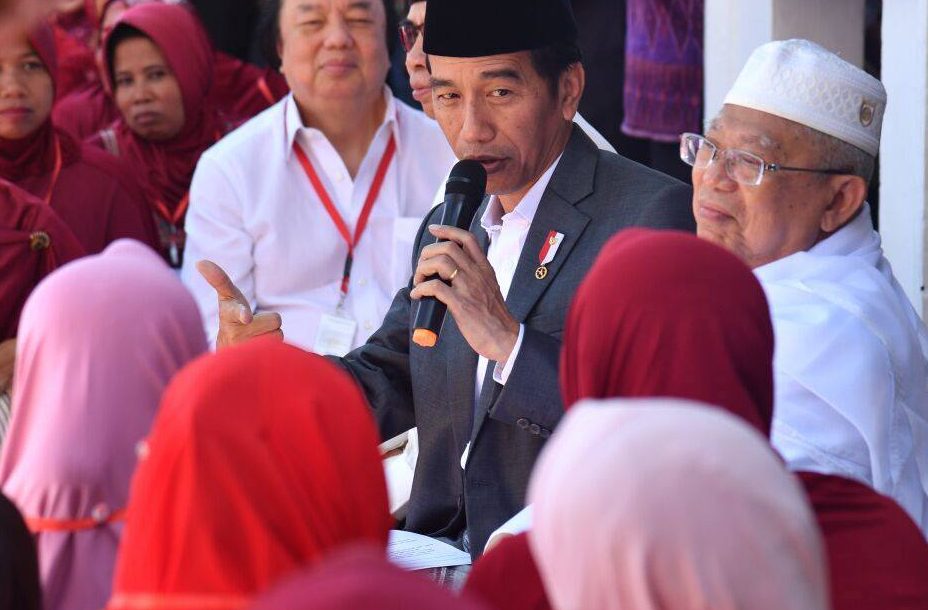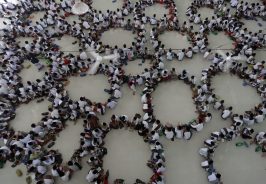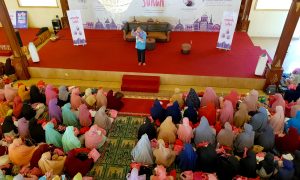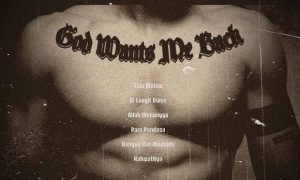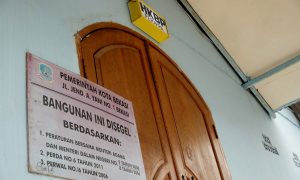The image was incongruous: President Joko Widodo (Jokowi), who wants his presidency defined by Indonesia’s rapid economic development and modernisation, stood awkwardly before the media on 10 August with his newly announced vice-presidential candidate, Ma’ruf Amin, a 75-year-old conservative Islamic scholar clad in traditional sarung and sandals. Answering criticism of his choice, Jokowi praised his running mate as “an untarnished figure, a wise ulama (Islamic scholar) who is respected across the Islamic community”. He proclaimed that with Ma’ruf on his ticket religion and nationalism would complement each other.
Indeed, Ma’ruf Amin is the most powerful ulama in the nation. Since 2015, he has occupied two pre-eminent positions: rais aam (president) of Nahdlatul Ulama (NU), the nation’s largest Muslim organisation; and chairman of the Indonesian Ulama Council (MUI), the paramount state-endorsed body for issuing rulings on Islamic issues. Prior to this, he was an influential member of Susilo Bambang Yudhoyono’s Presidential Advisory Council (Wantimpres).
The story of how Ma’ruf came to be Jokowi’s presidential partner tells us much about the dynamics of contemporary Indonesian politics. As many commentators have observed, the president’s search for greater Islamic credibility was the primary reason for Ma’ruf’s elevation. But to explain why Ma’ruf rather than one of the many other prominent Islamic leaders was chosen requires a closer look at his career and sources of legitimacy. Conservatism has been an important, but by no means the only, element in his rise.
A political ulama
Ma’ruf’s career has been driven as much by his prowess as an Islamic politician as by his expertise in Islamic law. He was born in Tangerang in 1943 into a family of modest means and standing. He was the only child of a middling local kiai (Islamic scholar and teacher) but lacked the blue-blood pedigree that would guarantee rapid advancement. Some of his more enthusiastic proponents claim that he is a descendant of Syeikh Nawawi of Banten, one of the most renowned ulama in Indonesian history, though Ma’ruf’s biography makes clear that his descent is not direct but rather “via a relative who was close to” the syeikh. Nonetheless, he played up his association with Syeikh Nawawi by naming his Islamic boarding school (pesantren) in Banten after him and rarely corrected those who often introduced him as the great ulama’s descendant.
He began his education at local Islamic schools before pursuing his secondary schooling at the famous Tebuireng pesantren in Jombang, East Java, a nursery for many future NU leaders. Contemporaries suggest he was a capable but not exceptional student. What he did excel at was inter-personal relations, and in Tebuireng he established connections with many of the kiai and fellow santri who would be important to his advancement. He later completed his undergraduate and masters degrees in Islamic Studies at Ibn Chaldun University in West Java in the early 1960s.
As a young adult, Ma’ruf lived in the tough Jakarta port district of Tanjung Priok, where he busied himself as a preacher and Islamic teacher. His emphasis on traditionalist orthodoxy found favour among the religiously and socially conservative Betawi community that predominated in the suburbs of northern Jakarta. More importantly, he began to establish himself as an astute and hard-working networker and political organiser. He coordinated dakwah (proselytisation) activities and became the chairman of the local NU young men’s organisation, Ansor, in 1964. Six years later he was head of the district branch of NU’s political party. He was elected to Jakarta’s provincial legislature (DPRD) in 1971, representing NU, and was immediately installed as chair of the combined Islamic parties’ fraction. In his 11 years in the DPRD, he was never without a leadership position. Part of his early success was due to his ability to establish trustful relations across disparate Islamic groups and parties. Ma’ruf understood well and socialised widely within this community and his conservatism gave him good standing. He developed a reputation in the DPRD of being an astute, often tenacious, advocate for traditionalist interests.
Ma’ruf was also adept at patronage, perhaps the most critical skill for an NU politician, and could direct resources to a wide range of grateful supporters, creating bonds of obligation that served him well as he rose through the ranks. In the early 1980s, Soeharto’s New Order tightened its control over the United Development Party (PPP), into which NU had been forced to amalgamate in 1973. Ma’ruf was one of many promising NU politicians culled from its candidate lists in 1982.
Following his departure from Jakarta politics, Ma’ruf concentrated on building his career within NU’s national leadership. He navigated his way through the brewing battle within NU between the reform group led by Abdurrahman Wahid (Gus Dur) and the politician-dominated “Old Guard” headed by long-serving chairman Idham Chalid. Ma’ruf was close to the Idham group but was careful to ingratiate himself with the reformers by subscribing to some of their ideas. When Gus Dur was elected NU chair in 1984, Ma’ruf was seen as an Idham-ite who was acceptable to the reformers. He secured the important position of secretary-general (katib aam) to NU’s Religious Advisory Board (Syuriah) in 1989, before becoming one of the board’s deputy chairmen in 1994.
An example of how Ma’ruf positioned himself between the reformers and politicians during this period is evident in his attitude to NU’s “Khittah 1926”, or return to the organisation’s founding charter of 1926. The Khittah prescribed NU’s withdrawal from formal politics, including PPP. NU leaders could no longer simultaneously be politicians and NU executives. Ma’ruf endorsed the Khittah but constantly pushed for a “loose” interpretation that would allow NU leaders to be involved in politics without having to resign their NU positions. Reformers regarded this as contrary to the spirit of the Khittah but he argued NU’s interests were best protected if it was politically active. Ma’ruf subscribed to the maxim of NU’s redoubtable co-founder, Wahab Chasbullah, that Islam and politics were as inseparable as sweetness and sugar.
Piety and patronage
Ma’ruf would return to practical politics in 1998 following Soeharto’s downfall when he was heavily involved in establishing the National Awakening Party (PKB) as NU’s primary electoral vehicle. He went on to be elected to the national parliament in 1999. His relations with Gus Dur, who was elected Indonesia’s president late that year, soured during this period and he left parliament in 2004.
His position on NU’s Syuriah, the organisation’s Religious Advisory Board, helped secure appointment to MUI in 1996, a position that soon enabled his emergence as a national figure. He was made deputy chair, then chair, of MUI’s powerful Fatwa Commission in 1996 and 2000 respectively. This coincided with the rapid growth in Indonesia’s Islamic finance sector. Once again, Ma’ruf seized the opportunity to maximise a role for himself and MUI. He drove the MUI decision to declare conventional bank interest haram, which helped push many devout Muslims towards Islamic banking. A National Syariah Council (DSN) was set up under the Fatwa Commission’s oversight 1999, with Ma’ruf assuming chairmanship of its executive.
This made him pivotal to regulating the burgeoning “Islamic economy”. Financial institutions sought his expertise to guide their operations and he soon chaired the sharia compliance boards of many of the largest players in the Islamic banking and insurance sectors, including Bank Muamalat, Bank Syariah Mandiri, BNI Syariah, Bank Mega Syariah, BNI Life Insurance and Asuransi Jiwa Beringin Sejahtera. Such positions were highly lucrative. According to a recent Corruption Eradication Commission (KPK) report on his wealth, Ma’ruf is a millionaire in dollar terms (Rp11.6 billion), with assets that include 10 properties and two luxury cars. By the mid-2000s, he had become the single most important ulama in Islamic finance.
It is also well-attested that Ma’ruf also used his influence in MUI to promote conservative, sometimes sectarian, agendas, drawing praise from Islamists but condemnation from progressive Muslims. He had long regarded Muslim sects such as Ahmadiyah and the Shia as “deviant”, and featured prominently in MUI campaigns to restrict or halt their activities. He was personally involved in MUI conferences and publications denouncing Shi’ism and, in his role on the Wantimpres, persuaded President Yudhoyono to partially ban Ahmadiyah. He took a narrow, indeed mistrustful, view of interfaith activities, upholding the long-held MUI stance that Muslims should not utter “Merry Christmas” to Christians or engage in any rituals of other religions. He also opposed any liberalisation of regulations limiting the building of places of worship, particularly for minority religions. His views on social issues were also conservative: he called for the banning of LGBTI activities in Indonesia and the prosecution of anyone found to be engaging in or promoting homosexual or transgender behaviour. He further appealed to the government to halt foreign funding for gay rights campaigns.
But his most significant political action within MUI came in November 2016 when, as chairman, he issued a “religious opinion” that Jakarta’s Chinese Christian governor, Basuki Tjahaja Purnama (Ahok) had blasphemed Islam and ulama by telling a campaign rally that the Qur’an did not prohibit Muslims electing non-Muslim leaders. Islamist groups had long opposed Ahok but MUI’s ruling on the blasphemy issue triggered massive mobilisation against the governor and police investigation of the speech. Following two massive demonstrations against Ahok in November and December, the governor was charged and jailed for insulting Islam. With his actions, Ma’ruf became a champion of those who believed their faith had been insulted. For Jokowi, who had been close to Ahok, Ma’ruf appeared as a hostile figure who used his position within MUI with potent intent.
Shortly after Ahok’s defeat, Jokowi began assiduously courting both Ma’ruf and NU. Ma’ruf became a regular visitor to palace functions and Jokowi often paid obeisance to the Ma’ruf by giving him pride of place and leading him deferentially to his seat. When Jokowi launched a government-backed sharia micro-credit bank in early 2018, he chose Ma’ruf’s al-Nawawi pesantren in Banten as the site of the first branch.
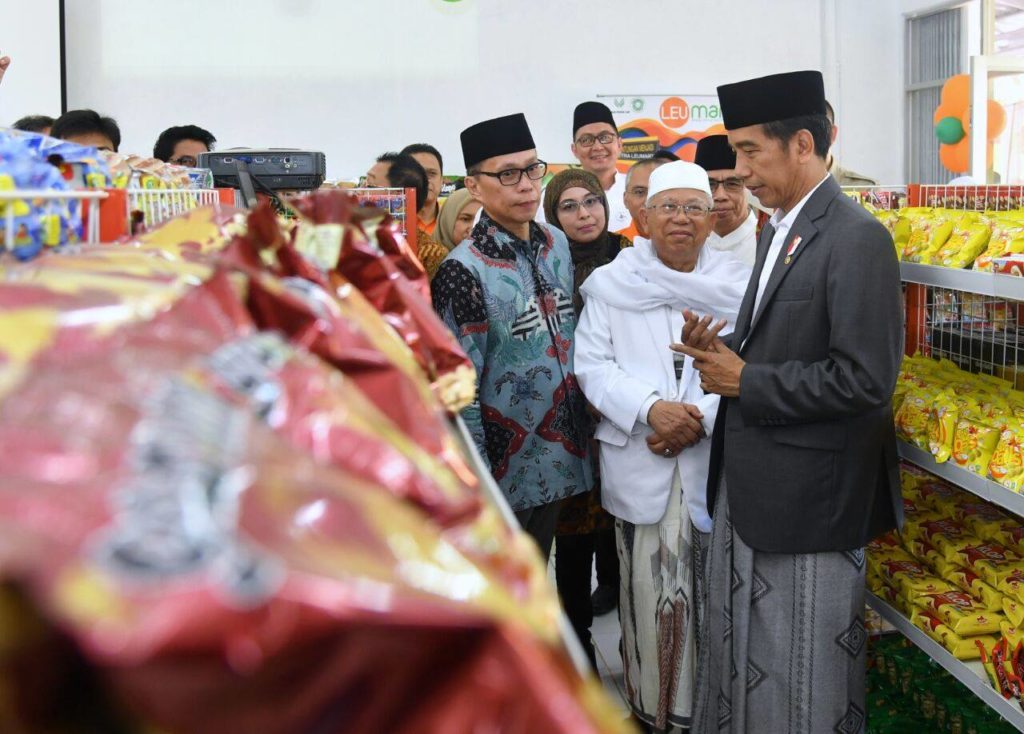
JOKOWI AT PONPES AL-NAWAWI WITH MA’RUF, MARCH 2018 (PHOTO: KEMENSETNEG ON FACEBOOK)
Vice-presidential nomination
Jokowi’s preferred choice for vice-presidential candidate was not Ma’ruf but rather the former Constitutional Court chief justice and ex-defence minister Mahfud MD. Ma’ruf had indeed been one of a number of “Islamic” vice-presidential options, with others including the PKB party chairman Muhaimin Iskandar and the governor of West Nusa Tenggara, Muhammad Zainul Madji (known as Tuan Guru Bajang, or TGB). Jokowi had for months closely studied survey results about the electability of various candidates and the depth and spread of their potential electoral support. The president was clearly nervous that, although enjoying a substantial lead over his main rival, Prabowo Subianto, he was still vulnerable to Islamist black campaigning.
Attitudes within NU and PKB towards Jokowi hardened in the weeks running up to the 10 August deadline for nominating presidential tickets, as the president’s preference for Mahfud became clearer. NU branches pressed the central leadership in late July and early August for an ultimatum to Jokowi: either choose a nahdliyyin (NU member) such as Muhaimin or risk NU withdrawing its support for the president. The NU central leadership needed little pushing on the matter, as it was also of the view that Jokowi was taking the organisation’s support for granted. Referring to the redistribution of state land being touted by the president, one senior NU executive complained: “Jokowi has promised thousands of hectares of land for NU but hasn’t delivered a single hectare. He’s just using NU and giving nothing back.”
NU was increasingly open in it assertiveness. Its chair, Said Agil Siradj, told journalists NU did not regard Mahfud as a nahdliyyin because he had never been active in the organisation—a clear warning to Jokowi that it would resist Mahfud’s nomination. Moreover, PKB and Ansor leaders previously known to be pro-Jokowi began raising the possibility of an extraordinary NU conference to reconsider the organisation’s stance on the presidential elections. PKB also reportedly joined with two other Islamic parties in approaching Jakarta governor Anies Baswedan to run as president as leader of a “third force” against the Jokowi and Prabowo coalitions, though he declined. In a bid to shore up support for Mahfud, Jokowi called in Gus Dur’s daughter, Yenny Wahid, to persuade NU to back his preferred candidate, but she failed.
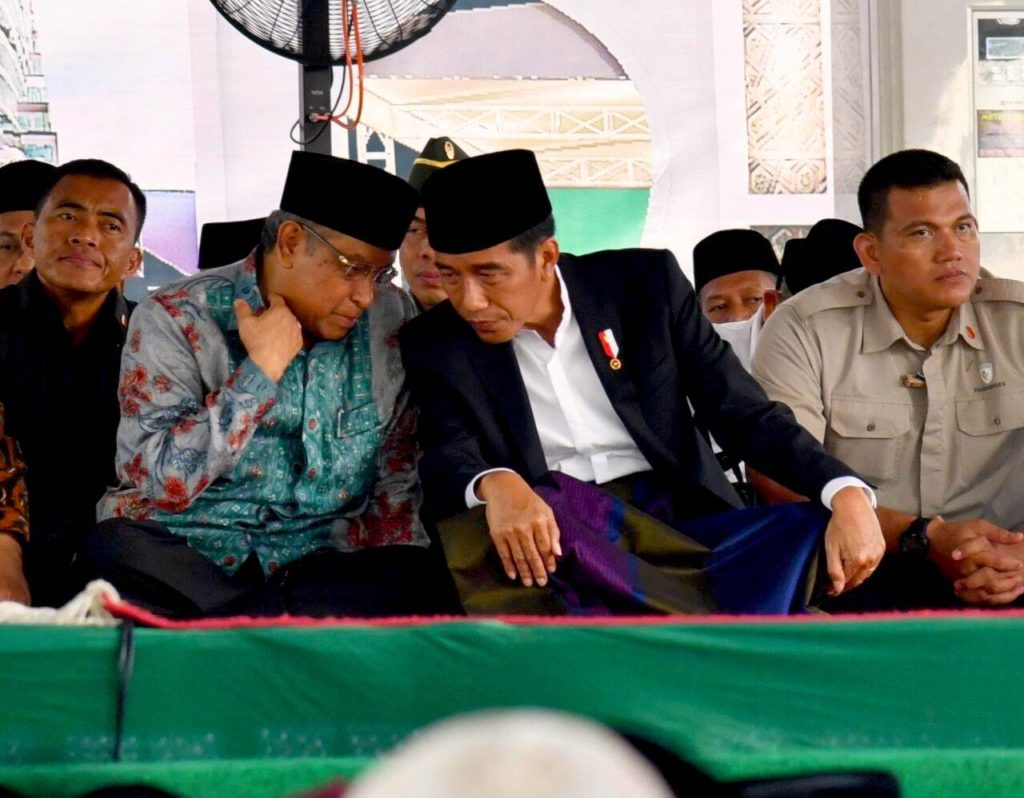
JOKOWI WITH SAID AGIL SIRADJ, MAY 2018 (PHOTO: KEMENSETNEG ON FACEBOOK)
Matters came to a head on 9 August when Jokowi was to formally announce his running mate after lunching with the chairs of his coalition partners. NU and PKB leaders had met beforehand certain that Jokowi would put forward Mahfud. They were equally determined to prevent this. Aware that Jokowi would not countenance Muhaimin, they decided that Ma’ruf would be advanced as NU’s candidate. Jokowi and Ma’ruf had a cordial, but not warm, relationship, underpinned by mutual self-interest rather than personal regard.
Faced at the lunch with strong objections to Mahfud from Muhaimin and other coalition party chairs, Jokowi at the last minute relented and took up Muhaimin’s suggestion of Ma’ruf as his running mate. A bitter Mahfud would later tell the media that Muhaimin admitted that Ma’ruf had ordered him to nominate the NU president, but there are reasons to doubt this. Ma’ruf had no “success team” and had not been lobbying within NU or the palace for the position (which is not to say that he was averse to being nominated). A more likely account is that Muhaimin himself urged Ma’ruf to stand so that NU would not miss the opportunity to occupy the vice-presidential palace, having had two of its previous leaders—Hasyim Muzadi in 2004 and Solahuddin Wahid in 2009—fail to do so.
A pillar of Indonesian civil society faces an ever more acute dilemma between representing a religious community and securing resources and influence within government.
Nahdlatul Ulama and the politics trap
Islamic bulwark or burden?
Commentators are divided about whether Ma’ruf will help or hinder Jokowi’s electoral prospects. One common view is that Prabowo, in choosing Jakarta’s deputy governor, Sandiaga Uno, had a better vice-presidential running mate than Jokowi. Sandiaga is seen as youthful and dynamic, as well as a highly successful pribumi (“native” Indonesian) entrepreneur—qualities that are likely to appeal to young voters and the upwardly mobile middle classes. The alternative view is that Ma’ruf will boost Jokowi’s support within the Islamic community, locking in many nahdliyyin (NU members) voters and also drawing substantial support from Islamist groups.
One of the first detailed early surveys on the electability of the two vice-presidential candidates by Denny JA’s LSI found that Ma’ruf is, overall, probably an electoral asset to Jokowi, though the figures are not conclusive. It showed that Jokowi’s personal electability is 54% compared to Prabowo’s 28%. When Ma’ruf’s name is paired with Jokowi’s, the president’s electability fell by 1.6%, roughly the same amount as Prabowo’s rose when Sandiaga’s name is added. But more importantly, it found that 53% of Muslim respondents intended to vote for Jokowi-Ma’ruf, compared to 28% for Prabowo-Sandiaga. 55% of NU respondents and 50% from Muhammadiyah said they would choose Jokowi-Ma’ruf compared to 27% and 36% respectively for Prabowo-Sandiaga.
Specifically on the vice-presidential candidates, Ma’ruf had the support of 45% of Muslim voters to Sandi’s 37%—a lesser lead than might be expected given the former is an eminent ulama and the latter has a reputation until recently for a racy lifestyle. In general, pious voters, as measured by those who prayed and read the Qu’ran daily, were more than twice as likely to vote for Jokowi and Ma’ruf, than for Prabowo and Sandiaga. These figures could change dramatically during the long coming election campaign, but they tend to support the argument that Ma’ruf lifts Jokowi’s Islamic credibility somewhat and significantly reduces the president’s susceptibility to Islamist black campaigns.
A reactionary vice-president?
If elected, what kind of vice-president would Ma’ruf be? Some commentators have predicted that he will bring his championing of conservative causes into the government and will behave much as he has in his role as MUI chair. This is certainly a possibility, but it is far from inevitable. Ma’ruf is not a one-dimensional figure and he has repeatedly shown an ability to adapt to different environments. Over the past year, since Jokowi began courting his favour, Ma’ruf has been much less outspoken on Islamist issues and he played a crucial role in defusing the looming controversy over the allegedly blasphemous poem read by Sukmawati, the daughter of former president Soekarno. His actions as NU president have also been more restrained than as MUI head. In short, he is capable of pursuing multiple agendas and of curbing his conservative impulses when it is in his interests to do so.
In all likelihood, Ma’ruf will be a vice-president with a limited remit. He has scant interest in most areas of government and little policy expertise outside of Islamic law and economic issues. He can be expected to use his vice-presidential office to expand his patronage networks and serve his supporters, particularly those in NU and favoured conservative groups. He will also welcome Islamists to the palace, much as Jokowi himself has done over the past year, in a bid to show the government is responsive to a broad range of community views.
The nearest historical parallel for Ma’ruf’s nomination is that of Hamzah Haz, who was Megawati Soekarnoputri’s vice-president from 2001 to 2004. Like Ma’ruf, he was from the Idhamist conservative political faction within NU and was also chair of the PPP party. At a time when Megawati was under sustained attack from Islamists who claimed that Islam forbade a woman from ruling over men, she opted for Hamzah as her vice-president in order to give herself Islamic legitimacy. As her deputy, Hamzah had a narrowly circumscribed role and confined himself to a small number political and religious matters. He occasionally made controversial statements, and regularly did the bidding of Islamic organisations, but his influence on Megawati’s government was limited.
Ma’ruf Amin is loathed by many minorities and progressive politicians and intellectuals, and not without reason. He has wrought considerable harm on social harmony and the rights of sexual and religious minorities over the past decade. But his conservative and sectarian tendencies are tempered by his political instincts, and his attraction to power and high status. These latter inclinations may lead him to be a less objectionable vice-president than his critics fear.
 Facebook
Facebook  Twitter
Twitter  Soundcloud
Soundcloud  Youtube
Youtube  Rss
Rss 